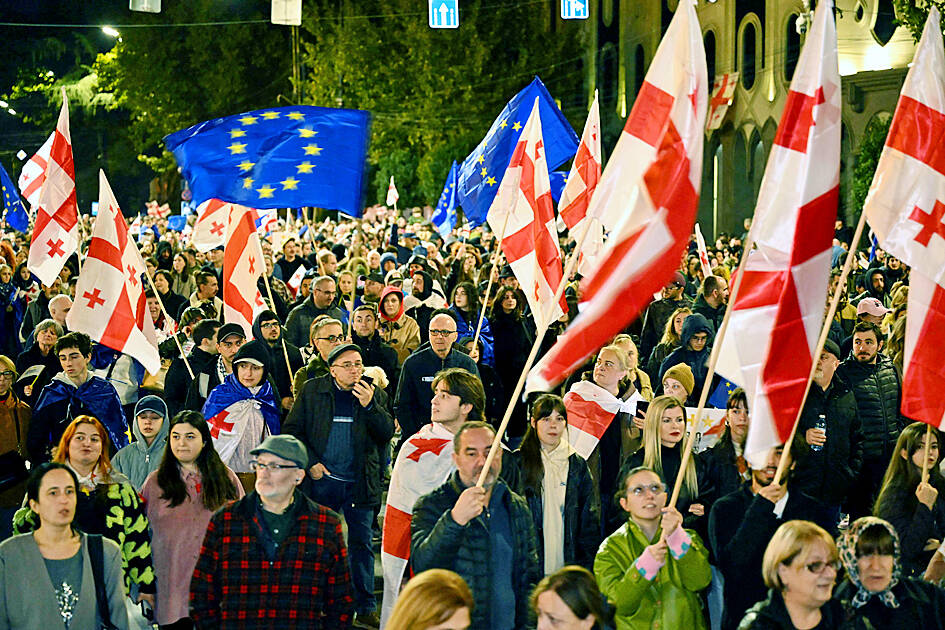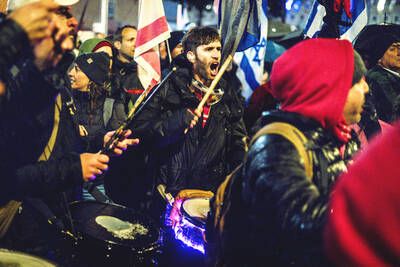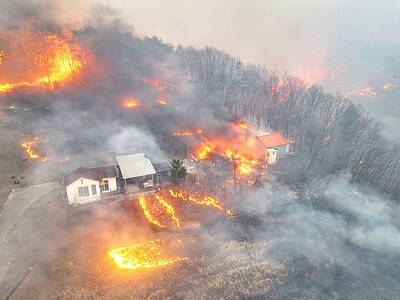Georgians are to vote tomorrow in watershed elections, with a union of pro-Western opposition forces facing off against a ruling party accused of democratic backsliding and shifting toward Russia. Brussels has warned the vote would be crucial for the fate of Georgia’s fledgling democracy and its long-held aspiration for EU membership.
Opinion polls indicate opposition parties could get enough votes to form a coalition government to supplant the ruling Georgian Dream party, controlled by powerful billionaire Bidzina Ivanishvili.
The current government says it wants to win a supermajority in parliament to allow it to pass a constitutional ban on the pro-Western opposition.

Photo: AFP
“Georgia’s traditionally fractured opposition forces have managed to forge an unprecedented united front against Georgian Dream,” said Gela Vasadze, regional programs director at Georgia’s Strategic Analysis Center.
However, “if the ruling party attempts to stay in power regardless of the election outcome, then there is the risk of post-electoral turmoil,” he added.
In power since 2012, Georgian Dream initially pursued a liberal pro-Western policy agenda, but over the past two years the party has reversed course.
Its campaign has centered on a conspiracy theory about a “global war party” that controls Western institutions and is seeking to drag Georgia into the Russia-Ukraine war.
In a country where the scars of Russia’s 2008 invasion remain unhealed, the party has offered voters bogeyman stories about an imminent threat of war, which only Georgian Dream could prevent.
In a recent TV interview, Ivanishvili painted an image of the West where “orgies are taking place right in the streets.”
The party’s passage of a controversial “foreign influence law” this spring, targeting civil society, sparked weeks of mass street protests and was criticised as a Kremlin-style measure to silence dissent.
The move prompted Brussels to freeze Georgia’s EU accession process, while Washington imposed sanctions on dozens of Georgian officials.
Earlier this month, EU High Representative for Foreign Affairs and Security Policy Josep Borrell cautioned that Georgian Dream’s actions “signal a shift towards authoritarianism.”
The upcoming polls are “a crucial test for democracy in Georgia and its European Union path,” he added.
Georgian Prime Minister Irakli Kobakhidze has vowed to lead Georgia toward EU membership, saying ties with the West would normalize once the Ukraine war ends.
However, the latest polls show that the opposition is poised to garner enough votes to form a coalition government.
The grouping includes Georgia’s main opposition force, jailed former president Mikheil Saakashvili’s United National Movement (UNM) and Akhali, a recently formed party headed by former UNM leaders.
Along with several smaller parties, they have signed up to a pro-European policy platform outlining far-reaching electoral, judicial and law enforcement reforms.
They have agreed to form an interim multi-party government to advance the reforms — if they command enough seats in parliament — before calling fresh elections.
A poll conducted by US pollster Edison Research recently showed that 34 percent of decided voters would cast their ballots for Georgian Dream, while the four opposition alliances combined are set to garner 53 percent of the vote.
The elections, held under a proportional party list system, would be monitored by international observers from the Organisation for Security and Cooperation in Europe.

DEATH CONSTANTLY LOOMING: Decades of detention took a major toll on Iwao Hakamada’s mental health, his lawyers describing him as ‘living in a world of fantasy’ A Japanese man wrongly convicted of murder who was the world’s longest-serving death row inmate has been awarded US$1.44 million in compensation, an official said yesterday. The payout represents ¥12,500 (US$83) for each day of the more than four decades that Iwao Hakamada spent in detention, most of it on death row when each day could have been his last. It is a record for compensation of this kind, Japanese media said. The former boxer, now 89, was exonerated last year of a 1966 quadruple murder after a tireless campaign by his sister and others. The case sparked scrutiny of the justice system in

The head of Shin Bet, Israel’s domestic intelligence agency, was sacked yesterday, days after Israeli Prime Minister Benjamin Netanyahu said he no longer trusts him, and fallout from a report on the Oct. 7, 2023, Hamas attack. “The Government unanimously approved Prime Minister Benjamin Netanyahu’s proposal to end ISA Director Ronen Bar’s term of office,” a statement said. He is to leave his post when his successor is appointed by April 10 at the latest, the statement said. Netanyahu on Sunday cited an “ongoing lack of trust” as the reason for moving to dismiss Bar, who joined the agency in 1993. Bar, meant to

DITCH TACTICS: Kenyan officers were on their way to rescue Haitian police stuck in a ditch suspected to have been deliberately dug by Haitian gang members A Kenyan policeman deployed in Haiti has gone missing after violent gangs attacked a group of officers on a rescue mission, a UN-backed multinational security mission said in a statement yesterday. The Kenyan officers on Tuesday were on their way to rescue Haitian police stuck in a ditch “suspected to have been deliberately dug by gangs,” the statement said, adding that “specialized teams have been deployed” to search for the missing officer. Local media outlets in Haiti reported that the officer had been killed and videos of a lifeless man clothed in Kenyan uniform were shared on social media. Gang violence has left

‘HUMAN NEGLIGENCE’: The fire is believed to have been caused by someone who was visiting an ancestral grave and accidentally started the blaze, the acting president said Deadly wildfires in South Korea worsened overnight, officials said yesterday, as dry, windy weather hampered efforts to contain one of the nation’s worst-ever fire outbreaks. More than a dozen different blazes broke out over the weekend, with Acting South Korean Interior and Safety Minister Ko Ki-dong reporting thousands of hectares burned and four people killed. “The wildfires have so far affected about 14,694 hectares, with damage continuing to grow,” Ko said. The extent of damage would make the fires collectively the third-largest in South Korea’s history. The largest was an April 2000 blaze that scorched 23,913 hectares across the east coast. More than 3,000